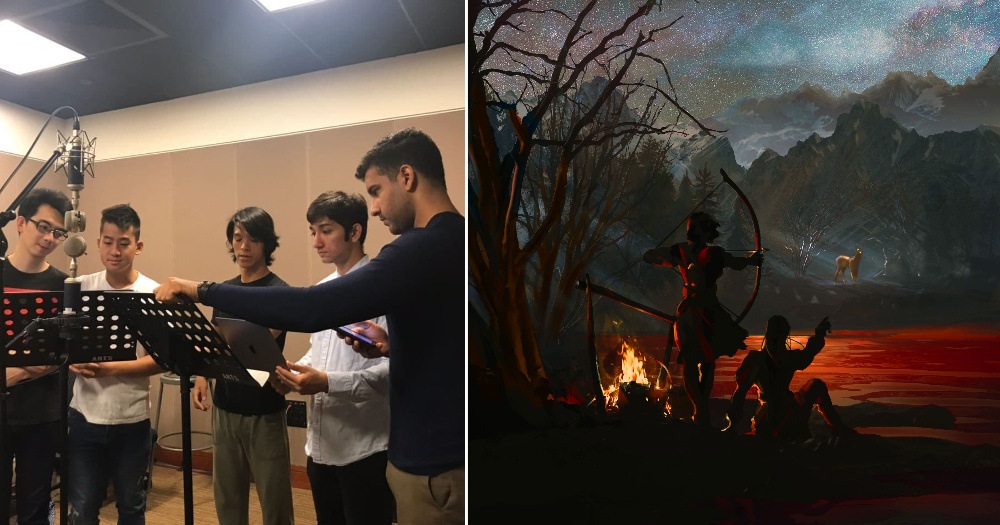HBO. The BBC. The Daily Show with Trevor Noah. You’d be forgiven for being flabbergasted by the news that a local, Singapore-based production is going toe-to-toe with these powerhouses to try and bag a coveted international award. And yet, that’s exactly what’s happening.
The production in question is called Temujin: An Audio Drama. And the big news is that Temujin has been nominated for a Webby award, in the “Podcasts - Limited Series & Specials” category – up for best scripted (fiction) podcast. The Webbys, affectionately dubbed the “Oscars of the Internet”, honour the best content available on the world wide web. The awards, with this year being the 25th Webby Awards, are presented by the International Academy of Digital Arts and Sciences (IADAS), which is made up of leading internet creatives, celebrities, and business figures (and past winners and nominees).
There are two honours in every category — the Webby Award and the Webby People’s Voice Award. While the IADAS makes its own pick for the Webby Award, the Webby People’s Voice Award is awarded by the voting public, and Temujin is trying to win votes for the latter, over its fellow illustrious big-name nominees. We’re not kidding about who Temujin is up against – the other nominees in the category are:
HBO’s Insecure: Looking For LaToya Podcast
The Daily Show with Trevor Noah’s The Daily Show Podcast Universe
BBC Sounds’ The Cipher
Onassis Foundation’s Live From Mount Olympus.
Temujin: An Audio Drama is the fifth and final nominee in the category, and you can vote for it in the Webby People’s Voice Award voting here. Voting closes May 6 2021.
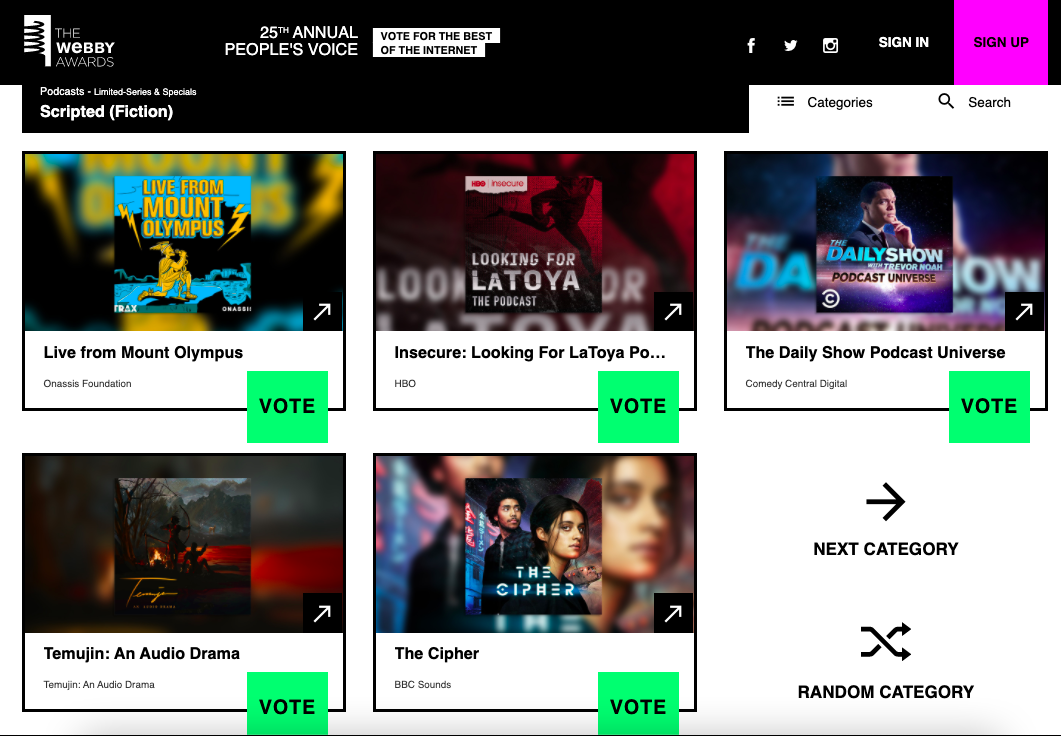 Screenshot via Webby Awards website
Screenshot via Webby Awards website
If you’re still reading and not voting (just yet) you’re probably wondering who or what a Temujin is. “Temujin” may not be familiar but another name probably is: Genghis Khan. Temujin was Genghis Khan’s birth name, and Temujin: An Audio Drama tells the tale of Genghis Khan and his childhood friend turned political arch-rival, Jamukha. Intriguingly, Temujin is told from Jamukha’s perspective, following his capture by Genghis Khan after two decades of warfare between their camps, and through Jamukha’s retellings dives headfirst into the history, strife and brotherhood between the two warlords.
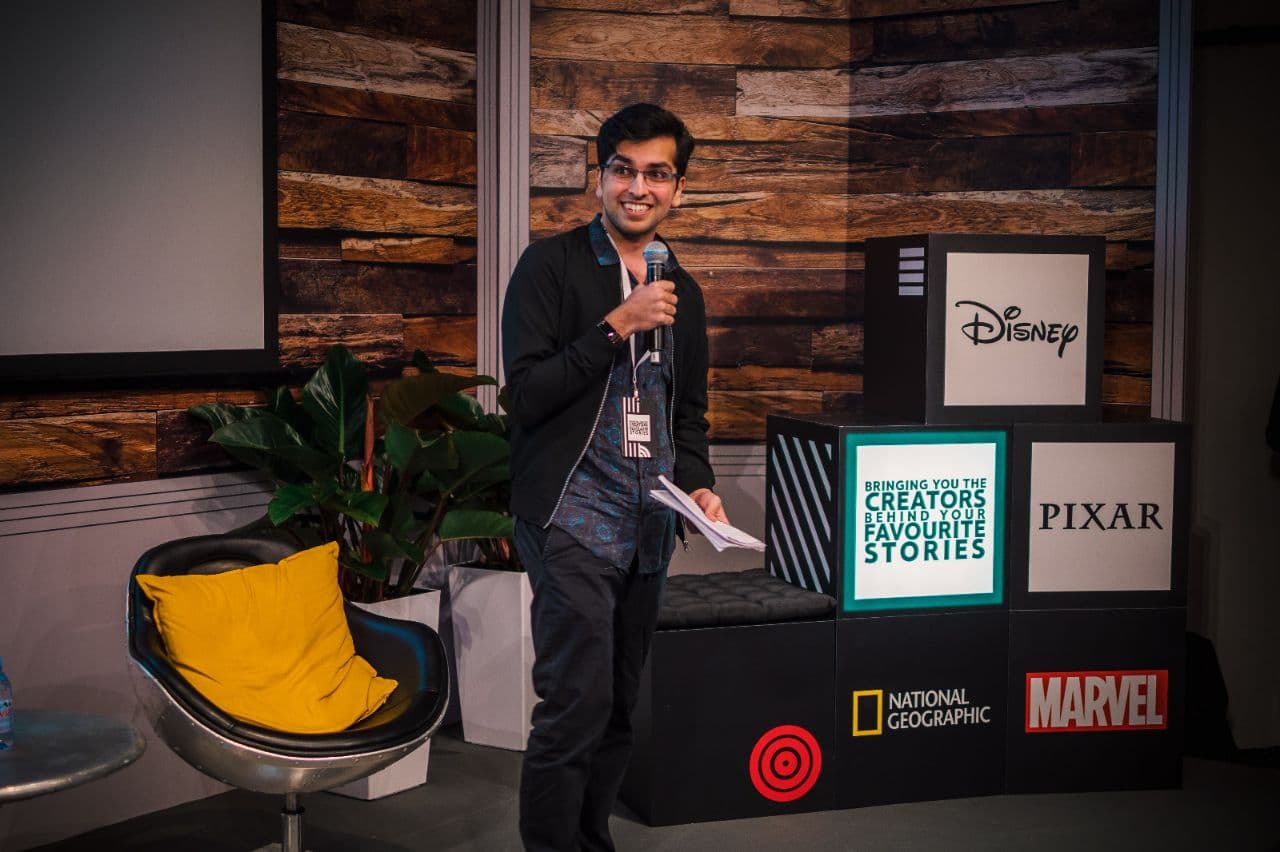 Photo courtesy of Roshan Singh
Photo courtesy of Roshan Singh
Roshan Singh, all of 26 years old, the Singaporean creator and driving force behind Temujin, began work on the project during his time at Yale-NUS College (he recently graduated with a specialisation in creative writing). Over many backbreaking months, Roshan pulled together a production team and a cast of voice actors including his college friends from and in Singapore, as well cast members from Indonesia, the Philippines and India, while also working to raise sufficient funding for the project on Kickstarter.
The journey of Temujin from being a mere spark in Roshan’s mind, to being realised as a full scale audio drama now nominated for a Webby, is a genuinely incredible one. We sat down with Roshan to ask him a few questions.
Mothership (MS): Tell us about the genesis of this idea. Where and when did the desire to tell the stories in Temujin first take hold?
Roshan (RS): My introduction to these stories came through my best friend (and our Executive Producer) Amarbold Lkhagvasuren, whose family hails from Mongolia. He once mentioned that he found the historical Genghis Khan more compelling than Shakespeare’s Hamlet, and suggested I do some reading. He pointed me towards Jack Weatherford’s The Making of the Modern World to begin with. Once I started it, I found myself unable to put it down.
I was expecting lengthy accounts of war and bloodshed, but those actually tend to be glossed over in favour of gripping exchanges between flawed and relatable characters. It’s almost entirely relationship-driven. The stories that we’ve chosen to feature in our adaptation are centred around possibly the most dramatically-charged relationship in the entire epic: the tragic, decades-long friendship of Jamukha and Temujin.
MS: We understand you travelled to Mongolia in the course of working on Temujin. How important was that in influencing the final product we can hear today?
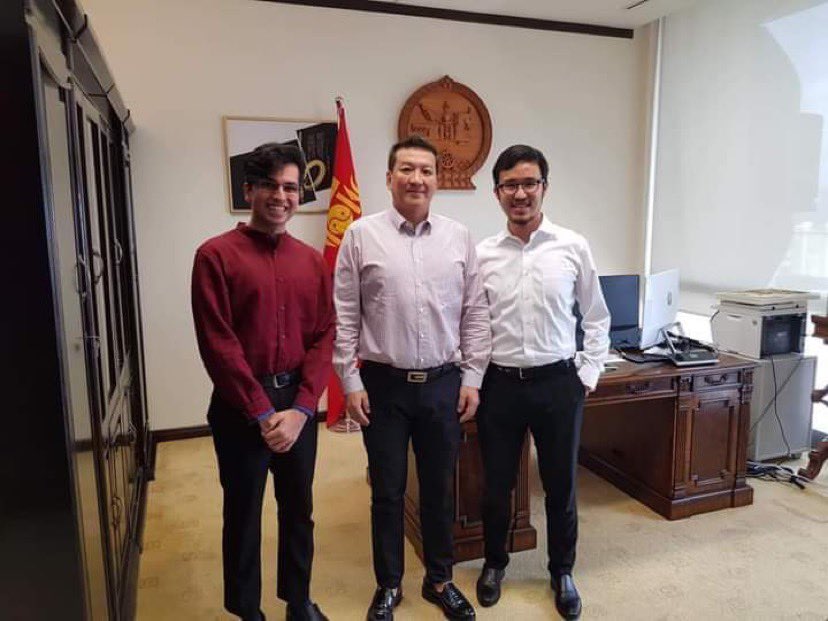 Roshan (left) with his friend Amarbold (right), flanking the Mongolian ambassador. (Photo courtesy of Roshan Singh)
Roshan (left) with his friend Amarbold (right), flanking the Mongolian ambassador. (Photo courtesy of Roshan Singh)
RS: I realised that the trip to Mongolia would be necessary pretty early on. It was partly a matter of further historical and cultural research, as you would expect, but also of geography. Early drafts made it clear that I couldn’t proceed with writing unless I could visualize what the characters were seeing and feeling. All the more so when we’re talking about the Mongolian steppes, which is an entity all its own.
I had the pleasure of travelling with Amarbold and his family, who helped curate a thorough itinerary. A large part of the journey was dedicated to covering the types of terrain that were being represented in the story, and understanding those spaces. Having been to those places allowed us to isolate its most evocative sounds, and to focus on replicating those. This is different from just, say, putting in live sound footage of the real-life steppes, which is packed with so many details that it can feel overwhelming to a listener!
MS: What was it about the format of an audio drama that appealed to you? Did you originally conceive it that way and how was the decision to make a full-scale audio drama made.
RS: Temujin was written as a stage play, but a series of unfortunate incidents (including my own surprise hospitalization) kept us from being able to stage it as originally planned. So, I decided to shrink things down to a live performed reading: just our actors, their scripts, and a packed audience. The results stunned us all, I think.
We found that oral storytelling amplified the rhythm, intimacy, and towering emotion of the drama. With the audience’s full attention on every breath and syllable, minute details in the actors’ performance were amplified. When friends embraced, the silence glowed. When a character issued a life-threatening command, the air choked. Nothing was missing: the room was full.
The audio drama retains the strength of character-driven performances, coupled with the immersion of a carefully-designed soundscape. Whether at their desk or on the train home, each listener is rewarded with a uniquely visceral experience — all within their earpiece. Just as important as any of this to me is the fact that virtually anyone can access the full show, from anywhere, free of charge! That’s a huge part of the reason we found an international listener base as large as we did, and we’re so grateful for that.
One last important point: the production requirements of audio fiction allowed us to focus most of our funding directly on compensating our partners for their time, and I’m proud to say that every single member of our young team was paid professional rates for their time. That’s a fairly rare privilege in Singapore’s creative scene, and I would love to see more teams make use of it to run sustainable productions.
MS: We’re very curious about foley sound effects – the way you reproduced the sounds of footsteps, battle, and characters generally interacting with the world around them. What are your favourite stories of producing unique sounds for the audio drama?
RS: This is a great question! We had a lot of fun trying to do as much live foley as we could, in an attempt to keep the action as authentic as possible. Of course, by action we also mean things like the rustling of clothes, exchanging objects, or running in and out of a scene (no one was actually shot, stabbed, or strangled in the making of Temujin. Thank goodness).
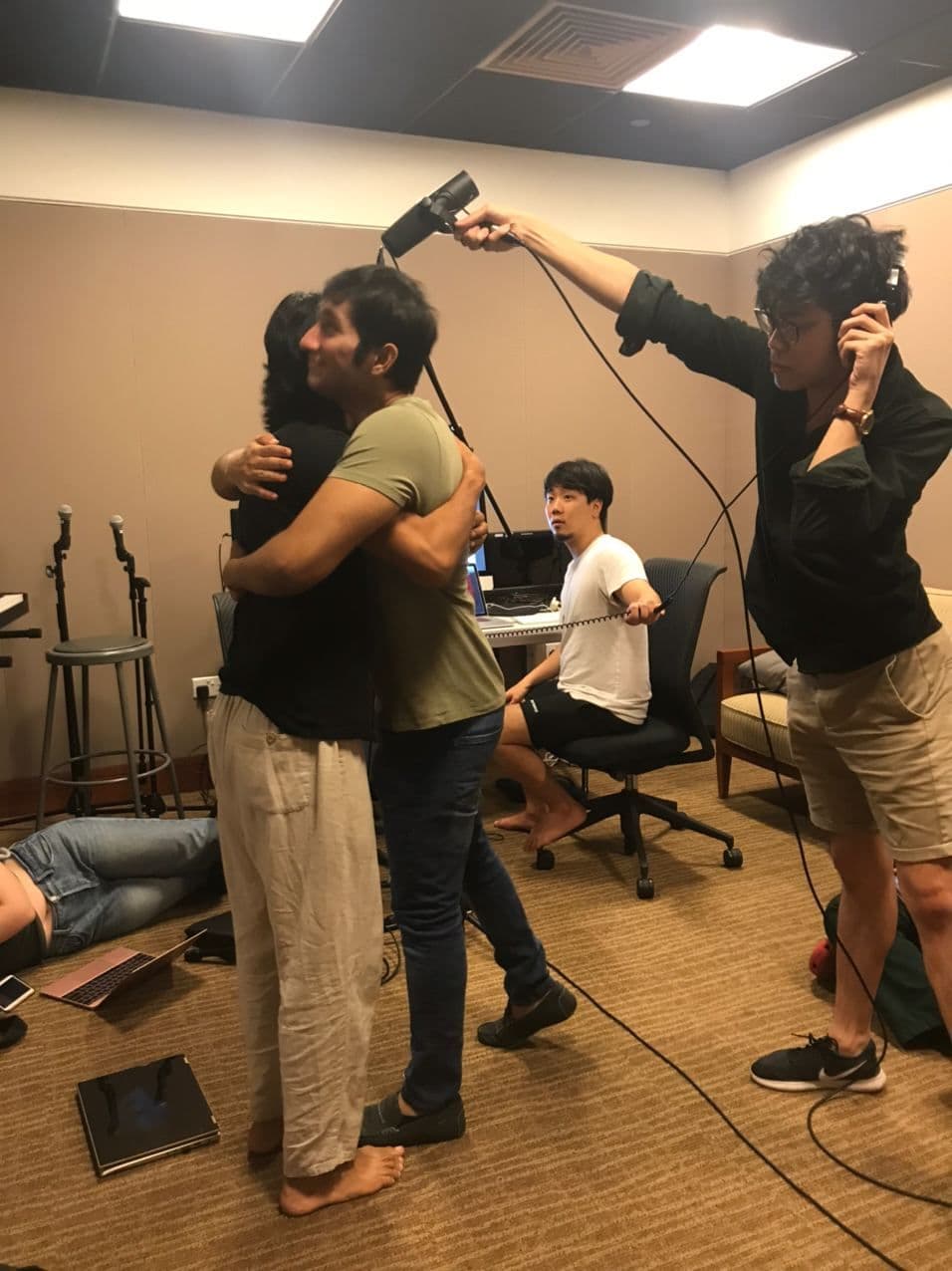 Hugging for foley. (Photo courtesy of Roshan Singh)
Hugging for foley. (Photo courtesy of Roshan Singh)
I think the one thing that turned out to be much more challenging than expected was hugging! We don’t think about how a hug sounds in day-to-day life, but when you isolate it, it can sound virtually identical to a light punch. Which isn’t exactly ideal in romantic scenes.
We actually wound up needing to do ‘hug rehearsals’ in the recording session during the last week of practice. Record, hug, listen back, repeat. After the audio drama came out, we received a comment from a BBC producer informing us that the “kiss scene” was her favourite part of the show! She must have been referring to the hug, but we chose not to correct her — we were just glad the sense of intimacy came across.
MS: So, the Webby nomination. When you heard the news – what was the very first thought running through your head? Talk us through how you’re feeling about it all.
RS: One thing with the Webbys is, you have to put yourself up for it. There was a conversation early last year about how far we wanted to push Temujin for awards — and putting ourselves up for the Webbys actually proved to be a bit of a hurdle in itself. When you look at the sort of shows that typically get nominated — I mean, when you look at our competition right now, it’s typically the best of the best stuff coming from Western cultural markets. Deciding to put ourselves up for this anyway was definitely a leap of faith.
So when we actually got the email announcing our nomination, it felt huge. A Singaporean show up there was something we genuinely couldn’t imagine last year. It’s something we can barely imagine this year!
There are two award processes with the Webbys: the critical judging, and the popular vote. When the initial excitement subsided, we realised we had a choice ahead of us — we either go about our regular business and hope for the best with the judging process, or we go all-out and compete directly with HBO, the BBC, Trevor Noah, and some of our favourite creators in the popular voting category.
The fact that we’re having this exchange is proof that we decided to go all-out with the latter! It’s a leap of faith, and a monumental amount of work, for sure. In order to secure the popular vote prize, we can’t come in second — we would have to get more votes than the current frontrunner, Trevor Noah. But taking leaps of faith is exactly what secured us this nomination in the first place, so we feel we owe it to ourselves and our supporters to try as hard as we can.
MS: So you’re battling it out with Trevor Noah’s Daily Show for the award. You’re allowed a solitary tweet that the man himself will read. What are you tweeting?
RS: Surprise! We actually went and did it.
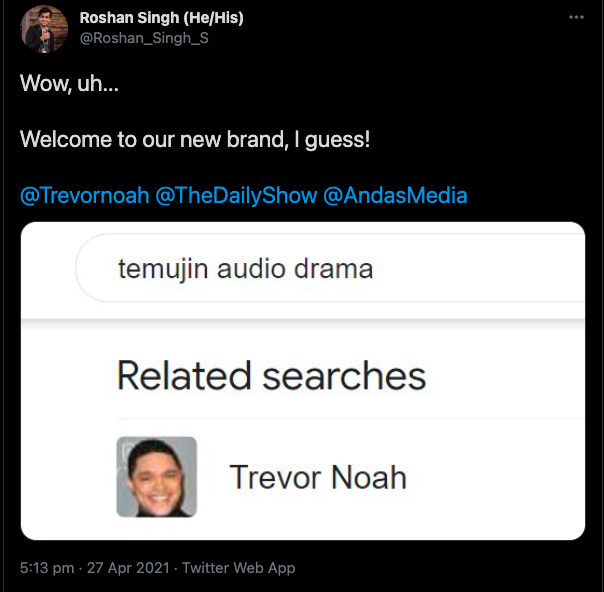 Screenshot via Twitter
Screenshot via Twitter
(Fun bonus: the Daily Show account liked a tweet on our page congratulating us on the nomination, so, we know they’re lurking around somewhere.)
MS: What’s next for Temujin after the amazing news?
RS: For the audio show itself — I think the team is proud of what we pulled off, and we don’t have any plans to meddle with it just yet. That said, we’ve started getting questions about film rights and the like, so who knows! We won’t shut down the possibility of this story finding new life in other forms.
As for the team, we’ve been hard at work at commissions and major new projects (audio fiction and video games) under the label of ‘Andas Productions’. There’s nothing formally announced just yet, but stay tuned!
MS: Without giving too much away… what are some of your favourite moments from Temujin – tell us about the parts that give you the most satisfaction when you listen to them again, or the segments that listeners have been most struck by.
RS: Easy — Act 5, the final episode. Most of it is just two guys in a tent talking, but I guarantee it’s one of the tensest scenes in the entire show. It’s no exaggeration to say that the two hours beforehand are all directly leading up to that one moment, which ends up...well, no spoilers! But I know multiple people in the team cried at some point working on it, myself included. I also loved composing the music, and I do listen back to those tracks every now and then!
You can check out Temujin: An Audio Drama on pretty much any platform, Spotify, Apple Podcasts, etc. – the links are all available at the Temujin website here. Also, spare a moment to vote for Temujin in the Webby awards here.
Top photo & cover art courtesy of Roshan Singh
If you like what you read, follow us on Facebook, Instagram, Twitter and Telegram to get the latest updates.
